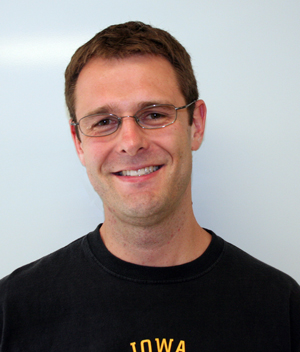Michael Iverson researches adult bilingualism, studying variables such as how well an adult can acquire a second language and sound like a native speaker. His dissertation examines an aspect of adult bilingualism called first language attrition (or loss).
While he has studied several languages, and is proficient in a few, Iverson says the languages themselves are not the ultimate object of study.
“I use Spanish and Portuguese as a tool to do research, a tool to get at language in the brain,” says Iverson.

Graduating from the UI in July 2012 with a Ph.D. in Spanish and Portuguese (with an emphasis in Spanish linguistics), Iverson was a Graduate College Presidential Research Fellow and has accepted a postdoctoral position at Macquarie University in Sydney, Australia.
Iverson’s dissertation case study focuses on a man from Chile living in Salvador, Brazil. Jason Rothman, Iverson’s dissertation co-advisor who is now at the University of Florida, found the case study subject about five years ago when purchasing art from the Chilean man. While they were talking, Rothman noticed the man’s first language was Spanish, not Brazilian Portuguese, but his Spanish was distinctly different.
Rothman soon told Iverson about this man and thought studying his relationship with language would make a good project.
Iverson began a comprehensive case study on first language attrition and made several data recording trips to Brazil. He conducted interviews and experiments designed to capture the Chilean man’s changing knowledge of particular structures of Spanish.
Rothman says Iverson’s research “shed a uniquely deep light on the parameters of language loss.” By researching one subject in great depth, using so many measures of testing, Rothman says Iverson’s work “provides insights into contentiously debated theoretical questions within linguistic science.”
“He has shown definitively that the process of attrition can be much more prolific and invasive than was previously thought,” says Rothman. “This in turn relates to questions of linguistic mental representation and cognition more generally.”
Linguistics and adult second language acquisition
Iverson says a working assumption of linguistics is that language is “its own thing,” a dedicated system in the brain. The portion of the brain used for language is considered to be modular, with dedicated units for syntax (word order), semantics (meaning), phonology (sound), and several other elements.
These modules do different things and inevitably interact as we use language to communicate. “If we change the word order in English or stress a particular word, we can change the meaning of the sentence—that deals with syntax and semantics,” says Iverson.
Linguists call it an “interface” when we must integrate these different types of information. According to the Interface Hypothesis, when a purely linguistic module such as syntax interacts with a module that involves extra-linguistic information, such as social context or world knowledge, a breakdown in meaning is more likely. “Properties that use these interfaces, or integrate these two types of information, are more vulnerable than ones that don’t have to use extra-linguistic information,” says Iverson.
In the case of adult second-language acquisition, Iverson says, linguistic skills that require this blending of cognitive registers would be the most difficult to acquire and, in the case of attrition, the most easily lost.
Iverson's continuing research
Iverson says he will continue to study first language attrition and continue to work with the man from his dissertation case study. “It would be really good to do the same thing I did on my dissertation, but use other languages,” he says.
Iverson theorizes very similar languages such as Spanish and Brazilian Portuguese may accelerate the attrition process, and he is curious to see if the same thing would happen with a speaker of two distinctly different languages.
The man with whom Iverson worked on his dissertation was effectively cut off from his first language, which is an increasingly rare phenomenon.
“It’s difficult to find people who are really isolated from their first language, because of the way immigrants tend to live in communities,” says Iverson. “And with modern technology, now it’s easy to call or Skype back home and talk to people that speak your native language.”
An interdisciplinary approach
Iverson began his own second language learning experience in high school. The Cedar Rapids native enjoyed his freshman Spanish class and chose Spanish as a major (along with biomedical engineering) at the University of Iowa. His Spanish major required him to take his first linguistics class.
“It was a scientific approach to language, and I’m very much a math and science-type person,” says Iverson. “I really enjoyed how we broke things up and took an empirical approach to how the language was constructed and used. I thought, ‘I want to do more of this.’”
His background in biomedical engineering has enhanced his learning process, adding an important interdisciplinary element to his education. “They train you to think and approach problems in a certain way, and it applies to a lot of different things—medicine or, in my case, linguistics,” says Iverson. As engineers, “we analyze things, and we pick things apart and solve problems.”
Iverson started working on a linguistics research project with Rothman during his senior year as an undergraduate and never looked back. “I kind of got swept up into linguistics,” he says. “I really like what I do.”
Rothman says working with Iverson over the course of seven years was “an absolute pleasure.” After working together for several years, Rothman says he began to see Iverson as more of colleague than a student. He has enjoyed seeing Iverson become an “incredibly adept researcher whose work is among the most well regarded in our field.”
Eventually, Iverson says he would like to come back to the United States, continue his research, and teach at the university level. “I’m particularly excited about being a mentor to graduate students,” says Iverson. “I’ve benefited greatly from my mentors, and I’d like to pay that forward if I can and get people involved and excited about linguistics.”